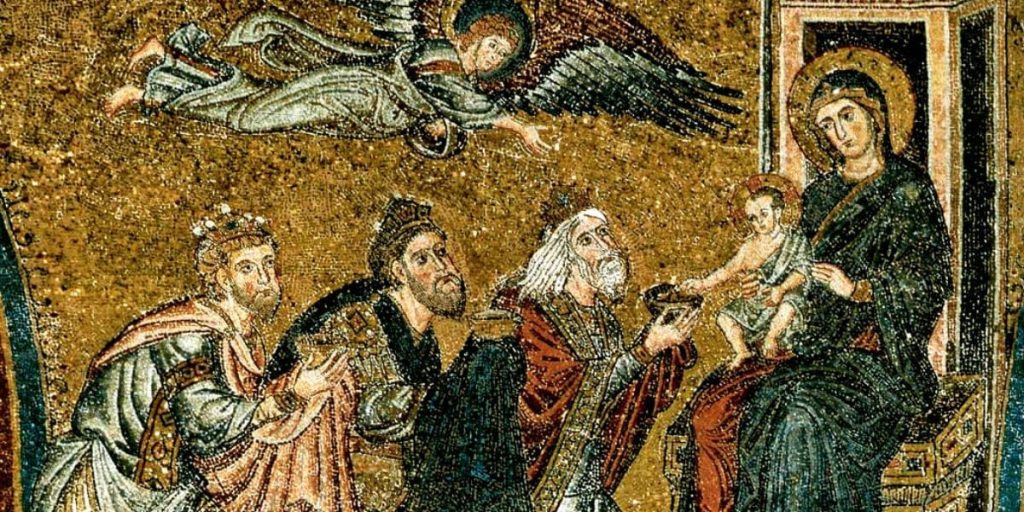For this week in our study of Matthew’s infancy narrative, we will be reading about that period immediately subsequent to Jesus’ birth as recorded in Matthew 2.
The Magi:
Matthew begins his post-birth story of Jesus by telling us that when Jesus was born in Bethlehem that “Magi from the East” arrived in Jerusalem looking for the birth of the next king of the Jews. Matt. 2:1. Matthew uses the word magi (not “kings” or “wise men”). This same word – magos – is translated as “magician” in Acts 13:6, 8. The question is who are the “magi?”
In his “Histories”, the Greek writer Herodotus (d.425 BC) speaks of the Magi. He writes that they are the priest of the former Median Empire (located in present-day Iran) who became incorporated into the Persian Empire of Cyrus the Great and later the Parthian Empire which extended from Rome’s eastern boundary to India. Cyrus the Great was the Persian king who conquered the Babylonian empire and, in 538 BC, allowed the Jews to return and rebuild Jerusalem. (Ezra 1:1-4). Not all the Jews returned to Jerusalem (Jews would still be found in this area until 1948), and the people, particularly the religious leaders, would have knowledge of Judaism. Since these men were of a priestly, educated caste and were astrologers/astronomers, they have often been called “wise men.” (Other ideas of where the Magi originated are here).
The idea that these men were “kings” comes from a later church reading of Psalm 72:10. There, the psalmist writes that the Kings of Tarshish, Seba, and Sheba shall bring God’s king tribute. For this reason, Psalm 72 is the traditional lectionary reading for Epiphany. From this reading, the church developed the idea that the three kings (Matthew does not tell us a number) came from European Spain (Tarshish), Asian Arabia (Seba), and African Ethiopia (Sheba).
The Star:
Matthew simply tells us that the Magi saw “his star in the East at its rising.” (The Magi, who were also in the East, did not follow the star’s location because otherwise, they would have ended up in India.) This star signaled the birth of the next Jewish king which is why Magi came to Jerusalem first. The next king should logically be born in the capital city. The “star” was a sign in the heavens that the next king of the Jews had been born. There are many theories as to the nature of the star. From my point of view, the most promising is a conjunction of Jupiter, Saturn, and the moon in Aries (often associated with the Jews) The actual astrological phenomenon is somewhat less important, however, than it caused the Magi to come forth.
Purpose of the Story:
The story of the Magi and the Star is an odd story to include in any Jewish writing (Matthew’s audience being Jewish). In our study of Genesis 1 two years ago, we looked at how the Creation Story of God creating the heavenly bodies denies their divinity and in turn denies the study of astrology itself. In the Hebrew Scriptures, both the prophets Isaiah and Jerimiah equate astrology with foreign idol worship and condemn it as a powerless pursuit. Isa 47:13, Jer. 10:2. The question, therefore, arises as to why Matthew would include the story in his narrative. Even if historically accurate, the story gives support to pagan religion. There are a few reasons, beyond history, why Matthew may have included the story.
First, the story of the Magi and the Star represents a great reversal of fortune for Judah. Throughout Scripture, the existential threats to Judah’s existence come from the East – first the Assyrians who destroyed the northern kingdom of Israel (2 Kings 17) and then the Babylonians who sacked Jerusalem and carried away the Jewish leaders into captivity (2 Kings 25). Babylon ruled Judah, then the Persians, the Greeks, and the Romans. But with the Magi, the roles are now reversed. At the birth of the Messiah, the East comes to Judah, not to conquer and plunder, but to bow down and worship and to bring tribute. In the Messiah, it is now the East that submits.
Second, the Magi are the first installment of the fulfillment of the Scriptural promises that God’s salvation will come out of Judah. God promises Abram that all nations of the world will bless themselves through Abram and his descendants. Gen. 12:3. Isaiah’s prophecies that God’s servant will be a light unto the nations. Isa. 49:6. And Micah says that all nations shall call the son of Judah blessed. Micah 3:12. It is these promises that the Magi fulfill.
Finally, the Magi show us that all who worship Jesus are not Jewish. Almost all of Paul’s letters address the issue of whether Gentiles must first become Jewish before becoming real Christians. The Magi show us that anyone can recognize and worship Jesus for who he is. In fact, in the second half of this story, it is the Jewish king Herod who tries to kill Jesus. Jesus not only calls the nations to him, but he calls them as they are without the precondition that they adopt the Law or otherwise become Jewish. Jesus is available even to the astrologers.
Dinner is at 6:30. The menu is pork chops with skillet apples. Discussion about 7:15. Please let us know if you plan to join us.
Behold Magi from the East came to Jerusalem saying: “Where is he who has been born King of the Jews? For we have seen his star in the East and have come to worship him.
Matthew 2:1b-2


Pingback: Epiphany – The Visitation of the Magi -Matt. 2:1-12, pt.1 – Ancient Anglican